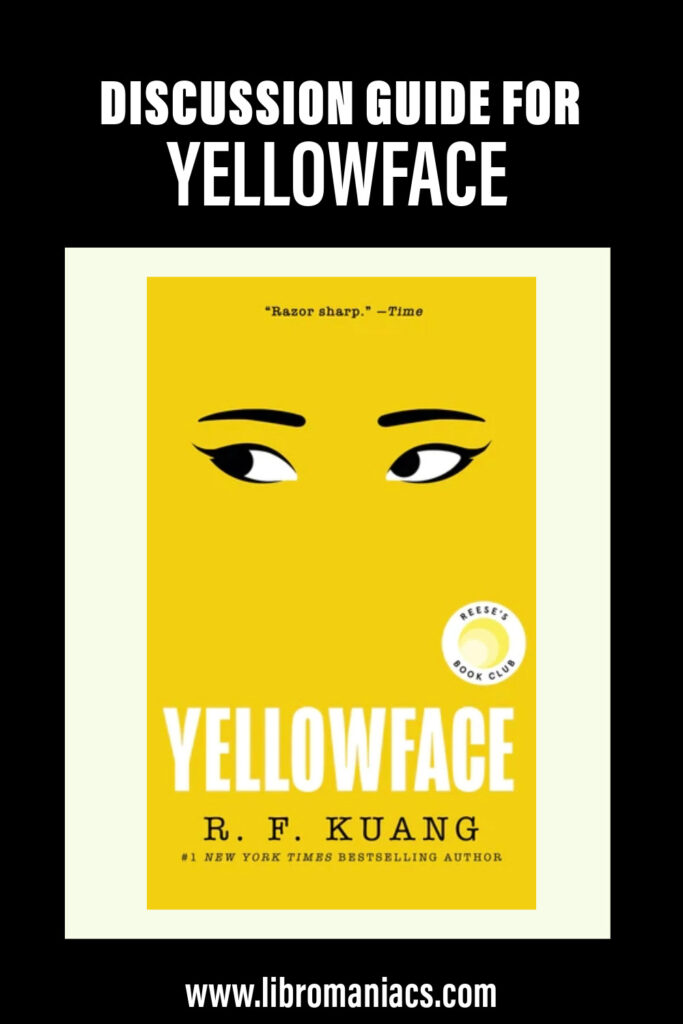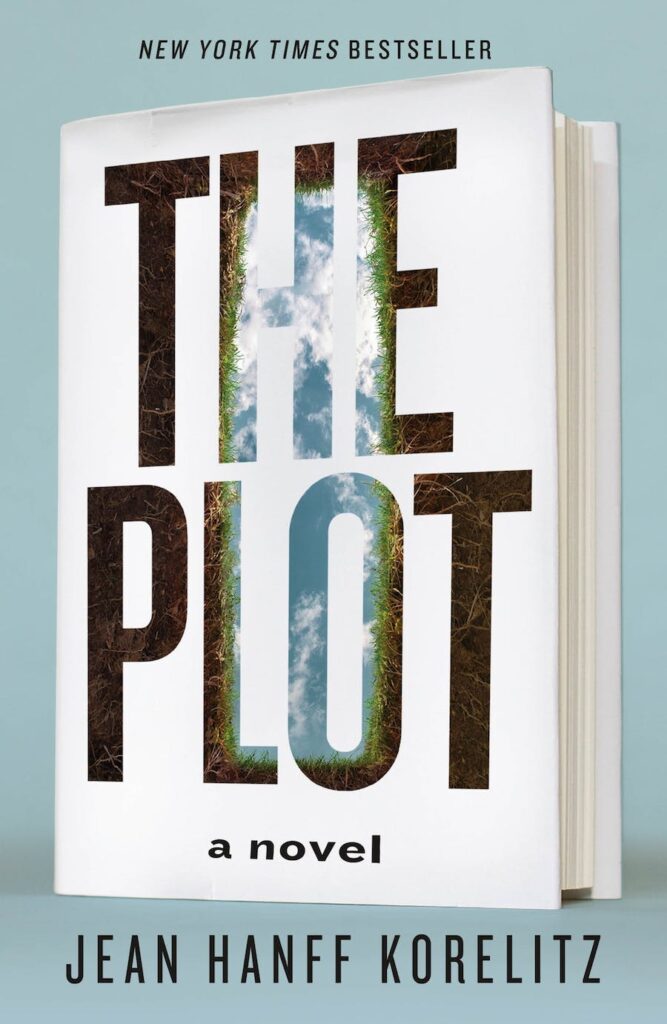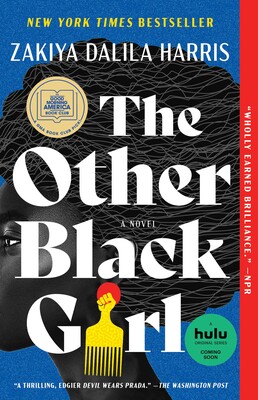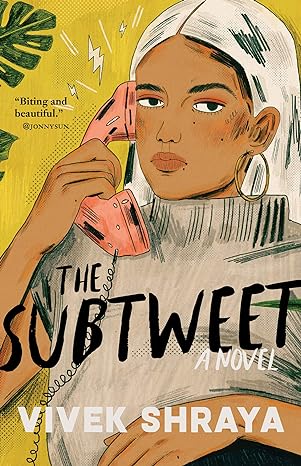Imagine you’re in the presence of a very famous author (think, ‘Reese’s Book Club pick’ level famous), as they take their untimely last breath. Now imagine that you alone have access to their unpublished literary magnum opus…. one that nobody else knows exists…. one that could propel you forward into a life of literary fame and fortune if only you just… take it. What would you do? This is exactly the scenario struggling author June Hayward finds herself in as R.F. Kuang’s novel Yellowface opens. Her decision sends her life spiraling out of control, and will have your book club spiraling into deep discussion on this novel’s complex themes!
With the highly competitive and volatile publishing industry as it’s backdrop, Yellowface is an examination of racism, cultural appropriation, the power of social media, and what it means to tell someone else’s story in a world where not everyone is heard. Use this Yellowface Discussion Guide to navigate these themes and more in your next book club meeting. Here you’ll find 10 Yellowface Book Club questions, along with the novel’s synopsis, a selection of reader reviews, and additional suggestions if you want more books like this one!
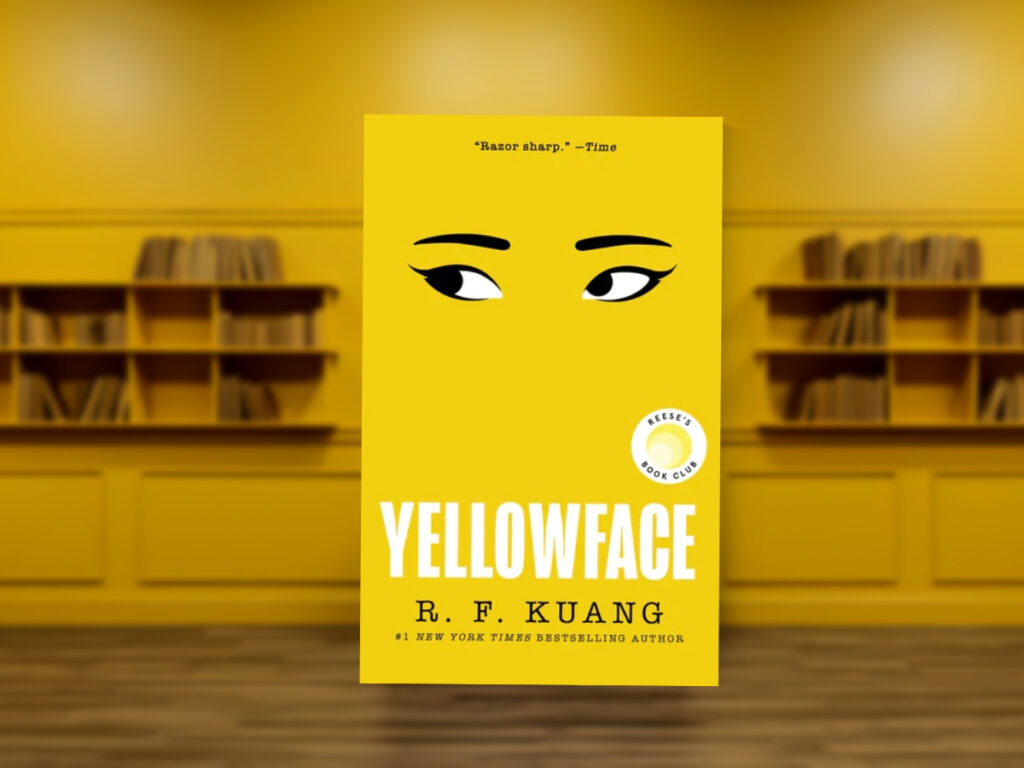
(This article contains affiliate links. This means that if you choose to purchase, I’ll make a small commission.)
Yellowface Synopsis
(We always chose to provide the publisher synopsis because we feel that it’s worthwhile to discuss whether the official book description actually squared with your experience of the book.)
Yellowface, R.F. Kuang
Authors June Hayward and Athena Liu were supposed to be twin rising stars. But Athena’s a literary darling. June Hayward is literally nobody. Who wants stories about basic white girls, June thinks.
So when June witnesses Athena’s death in a freak accident, she acts on impulse: she steals Athena’s just-finished masterpiece, an experimental novel about the unsung contributions of Chinese laborers during World War I.
So what if June edits Athena’s novel and sends it to her agent as her own work? So what if she lets her new publisher rebrand her as Juniper Song—complete with an ambiguously ethnic author photo? Doesn’t this piece of history deserve to be told, whoever the teller? That’s what June claims, and the New York Times bestseller list seems to agree.
But June can’t get away from Athena’s shadow, and emerging evidence threatens to bring June’s (stolen) success down around her. As June races to protect her secret, she discovers exactly how far she will go to keep what she thinks she deserves.
With its totally immersive first-person voice, Yellowface grapples with questions of diversity, racism, and cultural appropriation, as well as the terrifying alienation of social media. R.F. Kuang’s novel is timely, razor-sharp, and eminently readable.
10 Yellowface Book Club Questions
These questions have been tailored to this book’s specific reading experience, but if you want more ideas, we also have an article with 101 generic book club questions.
Looking for additional food for thought? You may want to check out this interview with R.F. Kuang, where she discusses the novel’s major themes and inspirations.
- If it was 100% guaranteed no one would ever find out, would you ever take credit for someone else’s work if it meant you would be successful in your career? Why or why not?
- For better or worse, June makes a number of changes to Athena’s novel before it’s published. Do you think these changes give June any right to claim The Last Front as her own?
- Throughout the novel, June receives criticism for writing a story about a Chinese experience without herself being Chinese. There was an actual kerfuffle on this topic with the novel American Dirt (an Anglo writer featuring a Latino immigration experience).
What’s your view on this topic – do you prefer stories to be “owned voices” or should authors be allowed to write about other peoples’ histories and experiences? At what point is this considered cultural appropriation?
- “But Twitter is real life; it’s realer than real life, because that is the realm that the social economy of publishing exists on, because the industry has no alternative.”
Was June’s addiction to social media reactions (both positive and negative) understandable? Discuss the pros and cons of having social media available as a platform for the praise, criticism, and debate of creators and their work.
- How did your understanding and/or perspective of the publishing industry change through reading this novel? Did you find anything problematic or surprising?
- Why do you think the author decided to make June and Athena both such flawed characters?
- It’s revealed that on multiple occasions, Athena used someone’s deeply personal story as the basis for her writing, nearly word for word. Does she have the right to do this? Why or why not?
- Did you find yourself rooting for June to be found out? Why or why not? When you learned who was behind trying to out June’s plagiarism scandal, how did you feel about their motivation?
- “Yellowface is, in large part, a horror story about loneliness in a fiercely competitive industry.” – R.F. Kuang
Much of the novel centers around the desire for acceptance; how did June’s feelings of rejection in her personal and professional life influence her actions?
- Could you still enjoy the works of an author or artist, if you disagreed with their actions, personal beliefs, or methodology of creating art?
Selected Reviews for Yellowface
(Use these selected Goodreads reviews to compare with your own experience of the book. Do you agree or disagree with the reviews?)
“This was so excruciatingly frustrating to read, but so necessary. And it’s so impressive that R.F. Kuang is able to write from the perspective of such an unlikeable character, yet keep the reader captivated from start to finish. The discussions about racism, microaggressions, and behind-the-scenes reasonings/justifications behind certain choices in the publishing industry, as well as the effects of social media and public events on authors are so eye-opening and honestly terrifying.”
“This book was genius! The main character is extremely unlikable but that is what makes this a fun read. June is prejudice, racist and entitled but continuously paints herself out to be the victim… The trick with this book is that at some points you might find yourself agreeing with June and have to check your own biases. It was also genius of Kuang to not make the Asian main character Athena a saint, she too has problematic behaviors but it was hilarious to watch June try to claim she was not really a minority because she essentially ‘made it.’”
“Ultimately, I found this book to be very readable, but stressful and underwhelming. It’s touching on issues that are relevant and important such as who should be telling certain stories, how we handle sensitivity readers, and the way that publishers cherry pick who they want to be a bestseller with a specific amount and type of diversity included. It’s a conversation starter, but I wanted more depth than what we get here… Again, because so much else here seems like a self-insert, I’m left wondering if this is behavior the author has engaged in. This was marketed as edgy but literary, and I just don’t think that’s what it is”
“I’ve seen the countless criticisms of Kuang inserting herself too much into this book, as well as the criticisms that indicate that there isn’t much to be gained from reading this book. I wholeheartedly disagree… Neither of the characters is likable and that is INTENTIONAL. This isn’t a way to illustrate that everyone in publishing is selfish, but a means to question how much the reader falls into the trap of engaging with the model minority myth. The expectation that Athena is supposed to be likable is deeply woven in the sociological phenomena that stereotypes many Asian communities as successful, smart, likable, diligent, docile, etc. and the idea that Athena doesn’t fit into that role has made some readers feel uncomfortable whether it is consciously or subconsciously.”
More Books like Yellowface
R.F Kuang is full of surprises and while most of her work deals with some aspect of racism (or classism), she refuses to confine herself to one genre. Her Babel is a spec-fic musing on the power of translations and the corrupting influence of colonial power. Read it for book club and use our Babel discussion guide.
Her Poppy War series is historical fantasy set in 20th century China. It starts in a magical school, but soon our kick-ass female main character (with shamanic powers) is called to war.
The Plot, Jean Hanff Korelitz
Like Yellowface, The Plot is the story of a struggling author who passes off the work of another as their own and uses it to reach new levels of success, only to then have the past creep up and threaten to destroy the entire façade. You’ll see similar themes in The Plot, such as what constitutes theft in the world of writing (can someone own an idea, and what happens to that idea if they are dead?), is success worth having if it could be taken away in an instant, and the perils and pitfalls of the publishing industry.
The Other Black Girl, Zakiya Dalila Harris
If you are looking for another satirical thriller with themes of racism and marginalization of POC in the publishing industry, then look no further than The Other Black Girl. This is the story of Nella, who, as the only black employee in her publishing office, faces daily microaggressions from her coworkers and is consistently overlooked.
When another Black woman Hazel joins the team, Nella is excited to finally feel like she has an ally. But all of that quickly changes, and Nella is forced to confront the fact that Hazel is not who she appears to be.
The Subtweet, Vivek Shraya
In the same way that Yellowface explores the darker side of the publishing industry, The Subtweet focuses on the music industry, and what it means to create art as a POC in an industry dominated by white people. If you enjoyed the role of social media in Yellowface, you’ll find further examination of its ability to both launch and undermine popularity and success in The Subtweet.
Share these Yellowface book club questions with your friends:
